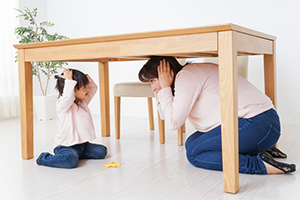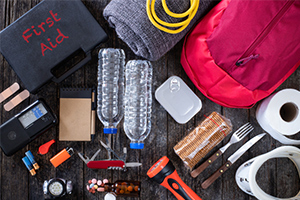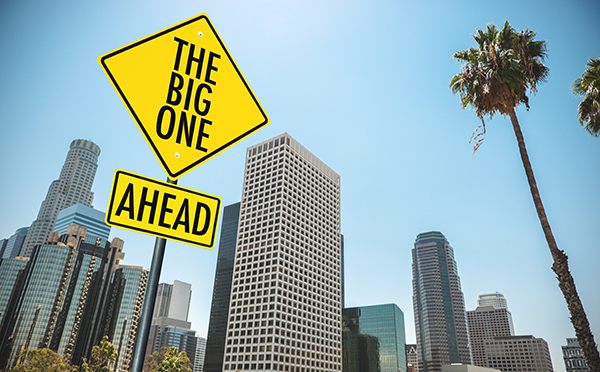Earthquakes may be one of the scariest natural disasters out there. At least hurricanes, tornados, wildfires, and floods are often predictable. Earthquakes happen without warning, striking any time of the year, day or night, and anywhere. Each year, during April, we encourage those who live in an earthquake-prone area to take steps towards becoming better prepared. Actions as simple as developing an evacuation plan, assembling an emergency kit, and having the proper insurance for your home and belongings. Here are five steps you can take to prepare yourself, your family, and your property before an earthquake strikes.
Understanding the Impacts of Earthquakes

While Alaska and California are known as earthquake capitals, there are many other fault zones in the United States. Larger shakeouts may cause injuries, deaths, and extensive property damage resulting from fire breakouts due to fuel pipelines and electrical lines that are ruptured or ripped during the quake. Most Californians have read about The Great 1906 San Francisco Earthquake that caused a massive fire in the metro area, damaging more than 25,000 buildings and taking the lives of an estimated 3,000 people.
Preparations Before an Earthquake
The best time to prepare for any disaster is before it happens. Follow these steps to become better prepared for responding to a natural disaster. We also have a disaster recovery checklist for you to follow after an emergency here.
1. Develop a Communication Plan
Ensure your family knows what to do if there is an emergency by creating an emergency communication plan. Everyone should have the contact number of a family or friend who can help during a disaster that does not live in the affected area. All mobile phones should receive emergency information via Wireless Emergency Alerts (WEAs) or from your local emergency services via text messages. Your family may not be together when disaster strikes, so it’s important to establish a meeting place that’s familiar and easy to find if phone lines go down.
2. Fix or Secure Potential Earthquake Hazards

It’s essential to prepare and protect your home before an earthquake to decrease your risk of injury and damage. To prevent potential injuries, do a hazard hunt and secure items that might fall in your home. Consider retrofitting and making improvements to your home to fix structural issues that could cause your home to collapse. Here are some tips on identifying potential threats and items to secure:
- Anchor tall and heavy furniture such as bookshelves, drawers, and cabinets onto your wall studs to prevent them from falling during a quake.
- Avoid hanging paintings, picture frames, and mirrors over beds and sofas.
- Place large or heavy items at the bottom of your bookshelves to avoid the top being too heavy.
- Purchase TV straps to keep your TVs from toppling off of mantles or TV stands.
- Secure cabinet doors with latches to prevent contents from crashing on the floor.
- Consider installing shatterproof glass or safety films on windows and mirrors.
3. Identify Safe Places Indoors and Outdoors

Pick safe places in each room of your home, workplace, or school and practice Drop, Cover, and Hold On with each member of your household. A safe place could be under a piece of sturdy furniture such as a heavy desk or dining table. When choosing an area, stay clear from places where glass could shatter like windows, mirrors, and picture frames or where heavy furniture could fall over. If you are out in the open, try to cover your neck and head and if possible, try to get to an open area away from buildings, trees, telephone, and electrical poles.
4. Make or Update Your Earthquake Safety Kit

If you don’t already have one, put an emergency kit together. Take the time to build your emergency supply over time by adding a few items as your budget permits. At a minimum, your disaster kit should include:
- Bottled waters
- Non-perishable foods that require little or no prep
- Sanitation and personal hygiene items
- First aid kit with medicine and medical supplies
- Flashlight, radio, cellphone charger with extra batteries
- Power generator
- Extra clothing with sturdy shoes
- Dust mask, work gloves, and protective goggles
- Blankets or sleeping bags
- Multi-purpose tools
- Fire extinguisher and fire starter
- Whistle
- Emergency cash
- Copies of vital documents like deeds, passports, birth certificates, insurance policies, etc.
- Special items like pet food, infant formula, and diapers, if applicable.
Make sure you keep all these items in a safe place in the house, ideally in a large, durable, and waterproof container. It’s also a good idea to store mini versions of these kits in your car or workplace. Disaster kits should be reviewed and updated every two years with fresh-water, food, medicine, and batteries.
5. Get Earthquake Insurance Coverage

Once you know you and your family have everything prepared for an earthquake, consider financial preparations. Remember that a standard home insurance policy won’t cover you in the event of an earthquake. The best way to protect yourself financially is by adding Earthquake Insurance to your Homeowners, Condo, or Renters policy. Before a disaster occurs, speak with one of our Insurance Specialists at (855) 919-4247. We’ll go over your coverage options and help you get peace of mind knowing you won’t have to worry about paying for repairs out of your pocket.
The information in this article is obtained from various sources and offered for educational purposes only. Furthermore, it should not replace the advice of a qualified professional. The definitions, terms, and coverage in a given policy may be different than those suggested here. No warranty or appropriateness for a specific purpose is expressed or implied.


